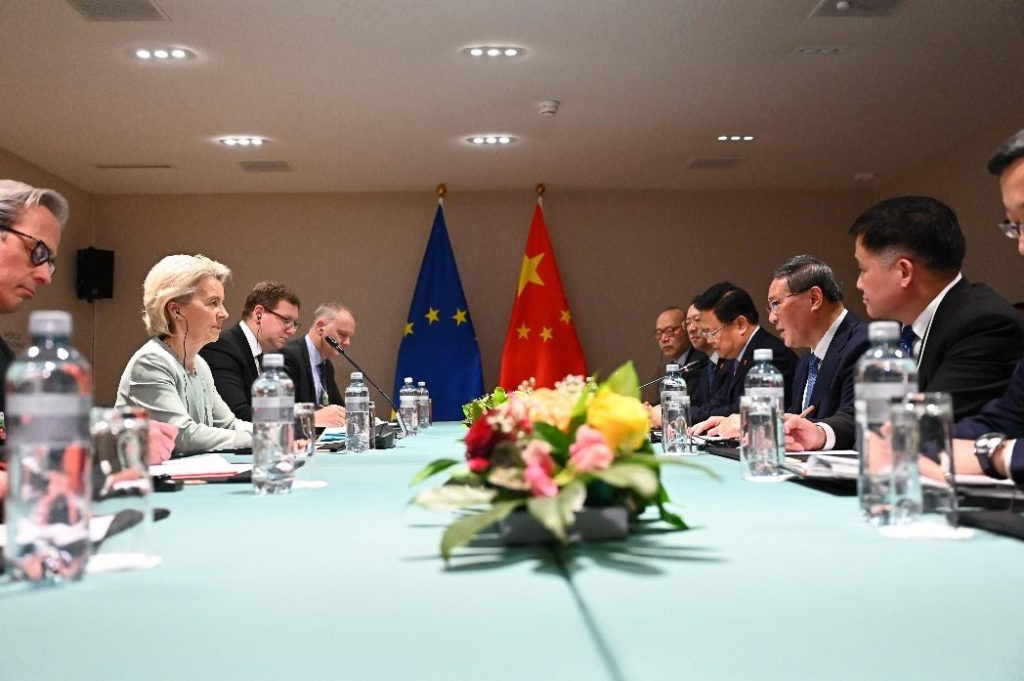On 24 January 2024, the European Commission officially unveiled the so-called Economic Security Package, which plans to strengthen the EU’s economic security and create a more cohesive European approach to both foreign direct investment (FDI) into the EU, as well as outbound investments out of the EU. Additionally, the EU aims to scale up technologies, while at the same time prevent any leakage, by implementing a more robust strategic trade toolkit. The ultimate goal is to strengthen Europe as a truly geopolitical and geo-economic position on the world stage. Although China was not mentioned in the 24 January press release, this new package can be considered as part of a broader initiative first announced in March 2023 by European Commission president Ursula von der Leyen to ‘de-risk’, but not ‘de-couple’ from China.
Background
Open, rules-based trade relations have shaped and benefitted the EU since its inception. At the same time, recent growing geopolitical tensions have highlighted the risks inherent in certain economic dependencies. A comprehensive strategy is essential for the EU to assess and manage risks, while at the same time maintaining its openness and international engagement. The new security package is part of a broader three-pillar approach to EU economic security: (1) promoting the EU’s competitiveness, (2) protecting against risks and (3) partnering with the broadest possible range of countries to advance shared economic security interests.

Although the new package is similar to recent U.S. economic security initiatives (particularly on the sectors identified as strategic for outbound investment), it tries to distinguish itself from the United States, especially in emphasizing country-neutrality. The European Union has also remained a key defender of the rules-based liberal economic order, and insists on sufficiently recognizing the risks associated with deglobalization.
Five main goals
The new package consists of five main goals.
First, the package strengthens the protection of EU security and public order by proposing improved screening of foreign investment into the EU. The European Union passed this foreign direct investment (FDI) screening regulation in 2019. On the 1st of July 2023, the mechanism also came into force in Belgium. As we explained in an earlier BCECC newsletter, although this screening mechanism is not specifically aimed at China, it may have an impact on Chinese investments into Europe in critical sectors or strategically sensitive technologies.
Secondly, the package encourages more European coordination in the area of export controls. The European Union wants to create an additional buffer against the future use of unilateral export control measures that could challenge the integrity of the EU single market. As a consequence, in the future, member states can impose authorization requirements on exports of items included in other member states’ control lists through a common compilation from the commission.
Thirdly, in terms of outbound investments by European companies, the new package calls for more effective EU control of goods and technology exports with “dual-use” potential, such as artificial intelligence, advanced semiconductors, quantum computing, and biotechnology. These advanced technologies could enhance military and intelligence capacities of actors who may use these capabilities against the EU or to undermine international peace and security.

Fourth, the package evaluates the options to enhance the scaling up of dual-use and advanced technology research. The overall approach follows the principle ‘as open as possible, as closed as necessary‘ with regard to international research cooperation. The EU intents to reinforce its role as a leader in the technology-driven geo-economic era, and recognizes that it must do far more to invest in a sustainable and durable way in the technologies of tomorrow.
And finally, the package proposes that the European Council implements measures aimed at enhancing research security at national and sector level, in order to protect research and advanced technology from leaking to strategic competitors. In today’s complex geopolitical context, the openness and borderless cooperation in the research and innovation sector may be exploited and turned into vulnerabilities. Results of international research and innovation cooperation can be used for military purposes in third countries, or in violation of fundamental values.
Conclusion
The EU strategy follows a long series of EU attempts at building a more cohesive geopolitical bloc, foster its strategic autonomy and be more independent from the United States while maintaining it as its closest partner. The BCECC welcomes this increased focus on a comprehensive policy throughout the EU, but hopes that this security package will not lead to more bureaucracy and higher costs for Chinese companies.
Despite regular assurances that the EU does not want to decouple its trade from China, according to a survey from the China Chamber of Commerce (CCCEU) and the consultancy firm Roland Berger, Chinese companies operating in Europe say they are facing uncertainty regarding their future, but nevertheless continue to invest in Europe.
The BCECC supports the European Commission’s objectives to reduce the dependency on China, notably on critical raw materials and products needed for the energy transition, such as solar panels and wind turbines. On the other hand, the BCECC is convinced that Chinese and European companies have a major interest in deepening its cooperation in many aspects and that putting up economic and financial barriers between the two global economic and technological forces does not contribute to a better understanding.
Please contact the Belgian-Chinese Chamber of Commerce (BCECC) in case you need more information.
